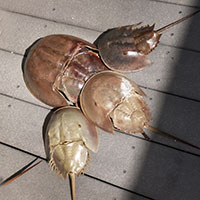 Pilot study gets underway on horseshoe crabs in the lagoon
Pilot study gets underway on horseshoe crabs in the lagoon
STORY BY SUE COCKING
Horseshoe crabs – those dark helmets with spindly legs and a sharp tail you sometimes see lying in the wet sand near the water line – have been around for hundreds of millions of years, and live in the Indian River Lagoon.
Today, their blood is critical for testing vaccines and other injectables for contamination, and their young are valuable in the aquarium trade.
But nobody knows how many there are in the lagoon or whether the population is healthy. To answer these questions, marine scientists have enlisted about 20 Indian River and Brevard county residents as volunteer field researchers in Horseshoe Crab Watch.
The pilot program, which began in 2015 in Florida's Big Bend region, is now being extended to the Treasure and Space coasts and scientists recently gave the volunteers a half-day of training at the Environmental Learning Center in Vero Beach.
"This entire program is based on citizen participation," Claire Crowley of the Florida Fish and Wildlife Conservation Commission (FWC) told the gathering.
The volunteers will be divided into teams of two – walking the lagoon shoreline near the St. Sebastian River Bridge and Sebastian's Riverview Park, as well as in Merritt Island and Titusville – from Feb. 19 through April 5 at high tide on the full and new moons.
The teams will look for breeding pairs and groups laying and fertilizing eggs in the wet sand – weighing, measuring and tagging as many as 12-15 animals per trip. They will note those with previously-implanted tags and keep meticulous records. They are also expected to be knowledgeable enough to educate curious beachgoers about what they're doing.
Some of the questions scientists want answered: How far do individual crabs move; do they come back to the same beach every year to mate; are their numbers increasing, decreasing or stable in Florida; what are their sex ratios and average sizes; what are the environmental conditions that stimulate breeding?
The data citizen scientists collect will be crunched by researchers at the U.S. Fish & Wildlife Service as part of a multiyear study of horseshoe crabs throughout their range along the East Coast.
A volunteer from Vero Beach identifying himself only as "Rick" said he got involved because "I'm concerned about the ecological balance of the Indian River Lagoon. It's intellectually stimulating."
As for Thomas Mauro, a volunteer who divides his time between Melbourne Beach and New Jersey: "I was fortunate to grow up on the water and watch these [crabs] as a little kid. As you get older, you start to appreciate these things you took for granted."
“Each year, the medical industry catches around 600,000 horseshoe crabs,” according to an article published in Business Insider in September. “The crabs are drained of 30 percent of their blood and up to 30 percent of the crabs don't live through the process. The survivors are returned to the water, but no one really knows how well or if they recover.”
A product known as LAL made from the creatures’ blue-colored blood sells for $60,000 a gallon. “Drop a minuscule amount of it onto a medical device or vaccine, and the LAL will encase ... bacteria in a jelly cocoon. While it can't kill the bacteria, the jelly seal is like a fire alarm, alerting [medical personnel] to the presence of what could become a potentially lethal infection and prevent it from spreading.”
“In 2016, the International Union for the Conservation of Nature bumped the American horseshoe crab up to vulnerable on its red list, one step below endangered,” according to Business Insider.




